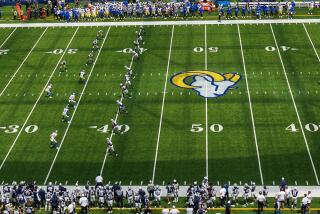Boredom Reduction on NFL Table : Convention: Many owners want to shorten the kickoffs and the lulls between plays. Coaches fear loss of control.
- Share via
PHOENIX — Sports fans will get an answer to a sensitive question this week during the NFL’s annual convention.
Who runs the league--the coaches or the club owners--when it comes to playing-field rules and regulations?
The two sides take generally opposite sides of the argument over two proposed rule changes:
--Kickoffs. Fewer kickoffs were returned last season than at any time in the last 20 years, “although this is one of the most exciting plays we have,” NFL Vice President Joe Browne said the other day. The cure for long kicks--kicking off from the ground rather than a tee--seems too radical for most coaches.
--Dead time. The NFL’s delays, 45 seconds between plays, have resulted in longer games, fewer plays per game and fewer points. The cure--shortening the period to 35 or 37 seconds--is also opposed by many coaches.
Of kickoffs, Carl Peterson, president of the Kansas City Chiefs, said: “It would help to kick off from the 30 instead of the 35.
Others say banning tees would help even more. According to proponents, a kickoff would then be more entertaining as well as more natural for two reasons: (1) the kicks would be shorter, and (2) only nine tacklers would be running down under the ball if there was a holder for the kick, resulting in more long returns.
Don Shula, the Miami Dolphins’ coach and a the veteran member of the rules committee, said: “When we’ve brought it up, most coaches have opposed a (no-tee) rule.”
One reason for their opposition comes from the Raiders’ No. 2 executive, Al LoCasale, who said: “The kickoff return is a dangerous play. The more (returns) there are, the greater the injury potential.”
Another reason is that coaches don’t like surprises--such as uncertainty over kickoff length. They have more control over games in which most possessions start at the 20-yard line, providing 80 yards of maneuver room in which coaching staffs can make their leisurely calculations.
The 45-second rule--which was voted in several years ago to speed up games--has backfired. The NFL’s average of 38 points per game last season was the lowest in 14 years. The average number of plays was also down, to 147 from a 1987 high of 160.
Worst of all, the games, increasingly, have been dragging along while the coaches parlay their 45-second delays to control the ball without even running it.
The average NFL game droned out to 3:01 last season, nearly 30 minutes longer than usual. If offense is the problem, as many believe, Denver Bronco Coach Dan Reeves has another kind of recommendation. Noting that the league’s noise-control attempts have been a crushing failure, Reeves said: “We need to do something to (help) the other offensive players hear the quarterback in the stadiums.”
Suggesting either amplification systems for quarterbacks or miniature helmet radios for all, Reeves said that false starts and slow starts, influenced by the roar of the crowd, led to 35 road-game sacks of passer John Elway last season, contrasting with 11 at home.
NFL Notes
As the meetings began, the NFL talked about giving away $196 million next year, but nothing came of it. During the 1993 season, the 28 club owners are each scheduled to get $41 million from TV in the last year of a four-year, five-network contract. . . . The networks want them to each take a $7-million cut in exchange for a 1994-95 contract extension. Among those fighting the proposal are owners Al Davis (Raiders), Norman Braman (Philadelphia Eagles) and Jerry Jones (Dallas Cowboys).
“Nothing’s decided yet,” said Art Modell of the Cleveland Browns after Sunday’s opening session. The television talk pushed back discussion of two other issues--the fate of the New England Patriots, whose owner, Victor Kiam, is having financial difficulties--and expansion.
The contracts, signed with CBS, NBC, ABC, ESPN and TNT in 1990, called for $3.6 billion over four years. In trying to sell an extension to the owners, they note that because of the recession, the advertising revenue has fallen off despite good ratings. One network source noted that even though CBS’ ratings for the Winter Olympics were higher than expected, the network barely broke even on its telecasts. NFL spokesman Joe Browne said the decision to discuss an extension beyond 1993 was due to “the uncertainty of network television and its advertising revenue.”
A system of using full-time officials is under consideration, NFL Vice President Browne said, but is not likely to happen. He said that 22 NFL officials will work World League games this spring. . . . Of the 11 cities seeking NFL membership in 1994, three or more will be eliminated this week. The front-runners seem to be St. Louis and Memphis, Tenn., or Charlotte, N.C. . . . Club executives continue to say privately that the NFL won’t expand without a collective bargaining agreement with the players. . . . Is it NFL hypocrisy that has led the owners to Arizona? Not long ago, they blocked Phoenix as a Super Bowl site when the state voted down an annual paid holiday for Dr. Martin Luther King Jr. Said Commissioner Paul Tagliabue: “As I’ve been saying, the Super Bowl is our (banner) event. It’s the controversy we didn’t want at Super Bowl time. We’ll meet in Arizona. We’ll play (regular-season games) in the state.”
More to Read
Go beyond the scoreboard
Get the latest on L.A.'s teams in the daily Sports Report newsletter.
You may occasionally receive promotional content from the Los Angeles Times.










